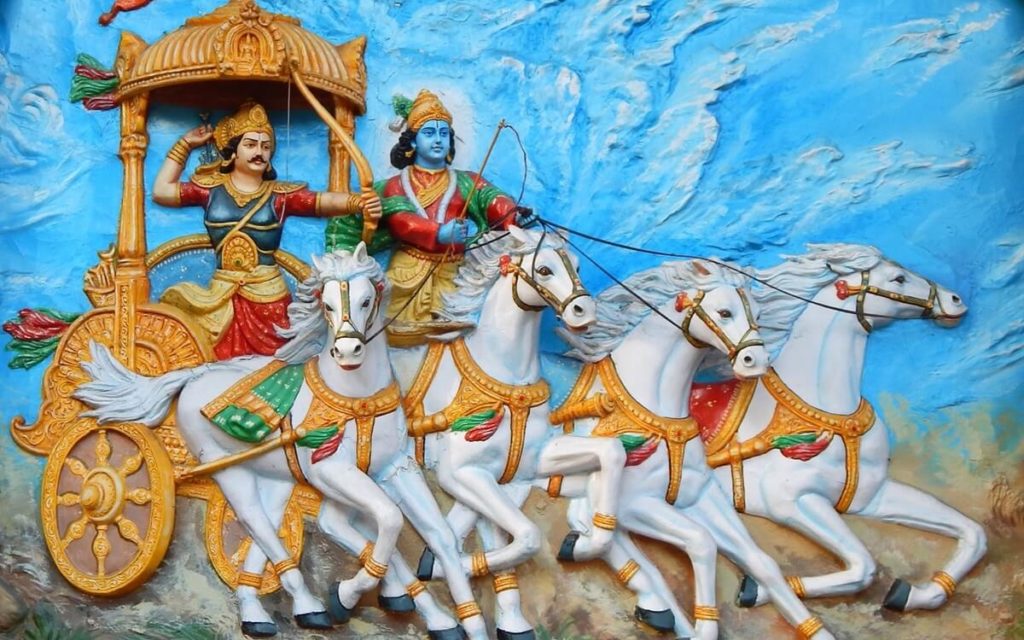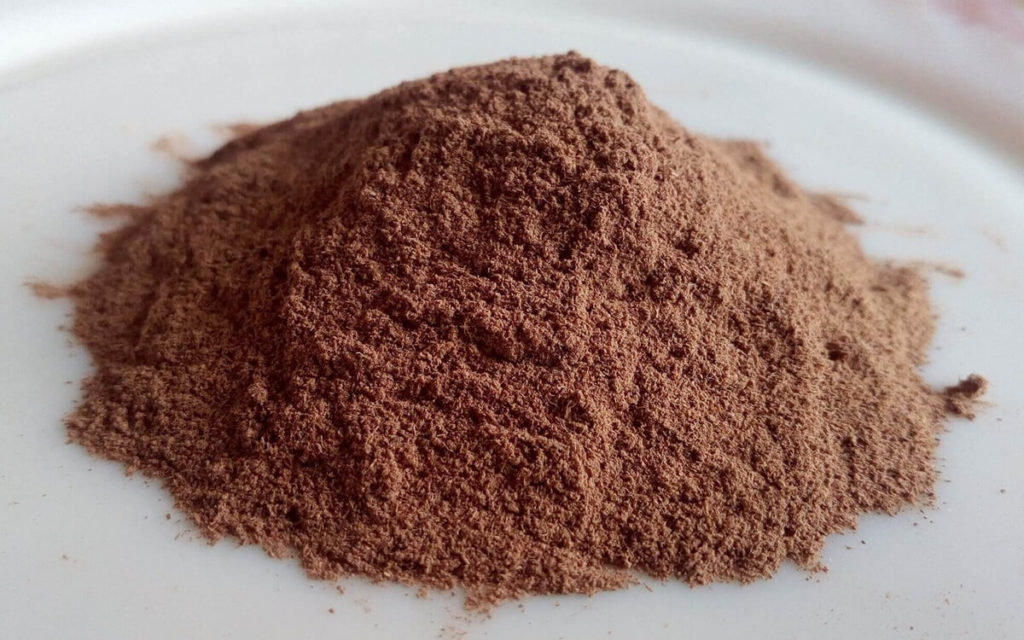Arjuna strengthens the human health center - the heart. The Indian tree is particularly valued in Ayurveda for its healing and invigorating effect on our vital organ. Find out here how the medicinal plant is used in European Ayurveda® and what positive effects its powder has on the heart.
Terminalia Arjuna: The Arjuna tree
The imposing Arjuna tree can grow up to 26 meters high and is native to large parts of India. Although it is a rather inconspicuous, evergreen tree with grey-white bark on the outside, the wood has an unusual, reddish color on the inside.


A powder is obtained from the red inner layer of the bark, which is characterized not only by its beautiful color, but also by its special ingredients. It contains 34 % calcium carbonate, 16 % tannin tannins, 9 % other calcium salts, aluminum, magnesium, organic acids, vegetable dyes and sugar.
For this reason, the bark of the tree is used in Ayurveda to achieve healing and strength. The spice also has a special significance in Indian mythology, as it is not only the name of a tree, but also that of a hero.
A heroic tree: mythology surrounding Krishna and Arjuna
The tree shares its name with an Indian heroic figure from the epic Mahabharata. Arjuna was Krishna's dialog partner and a brave fighter. It is said that one day the gods brought the Arjuna tree to earth when the hero needed emotional strength.


The tree helped Krishna's friend to regain his strength and so people should also be able to benefit from the good properties of the tree.
Use and effect of Arjuna in Ayurvedic medicine
Similar to the strong-hearted fighter and hero, wisdom and strength are also anchored in this tree. It is therefore not surprising that the bark is used in Ayurveda especially for internal ailments, such as those of the soul or heart.
The Ayurvedic medicinal plant is said to have the following effects, among others (2):
- strengthens the heart
- Purifies the blood and lowers blood pressure
- applied to wounds, it stops bleeding and accelerates healing (also for skin diseases)
- should heal bone fractures faster
Arjuna balances the two doshas kapha and Pitta and thus provides a feeling of inner balance and strength. The medicinal plant strengthens the heart both emotionally and physically.
Arjuna for high blood pressure
The spice improves the quality of the blood and blood circulation. It has a lipid-reducing effect and rebalances the various blood components. In this way, it ensures that the lifeblood flows well again and the circulation is stabilized.
It also helps to prevent edema and is used to lower high blood pressure.
Wound healing properties of Arjuna
The tree is also highly valued for its wound-healing properties. For example, arjuna can be applied locally as a paste to wounds and ulcers, as it has a hemostatic effect and supports healing.
But the bark extract is also effective in the case of bone fractures. Thanks to its astringent properties, it promotes healthy bone fusion.
Arjuna for skin diseases
The tree can also unfold its full effect on various skin diseases. In particular, complaints such as itching or conjunctivitis are alleviated by local application.
Leukoderma, the loss of pigmentation in the skin, can also be treated with it as a supportive measure.
Arjuna: Balm for the heart
In addition to all these positive effects, the tree has a very special meaning for the heart in Ayurveda. Due to its strengthening and healing properties, Arjuna has always been used as a heart tonic in Indian medicine.
The heart is the expression of life, as it is a vital organ and at the same time the center of our emotions. In Ayurveda, the heart is also the seat of consciousness, spiritual values and mental abilities. It can also be particularly addressed through heart meditation.
It is therefore particularly important that the heart is well and strong enough to keep us mentally and physically centered. Arjuna is particularly beneficial for the heart and has been used in Ayurvedic medicine for thousands of years to treat cardiac dysfunction (1).
It strengthens both the emotional and physical heart and strengthens the heart muscle. This reduces the frequency of the heartbeats, but at the same time increases the stroke volume. In other words, the heart needs fewer heartbeats, but beats with extra force. This extends the heart's relaxation period and relieves the muscle in a natural way (4).
However, the heart also connects the body with the soul. Ayurveda recognizes this special relationship and therefore also uses the medicinal plant for emotional burdens. The powder is said to help heal broken hearts and gives strength and courage to regain new vitality. Arjuna is therefore said to have a particularly life-enhancing effect.
Does Arjuna also have side effects?
In principle, there are no known side effects of the powder (2). However, if you suffer from heart problems, it is still advisable to consult your doctor.
Always stick to the recommended dose when taking it. As there is still little research on taking Arjuna during pregnancy, you should refrain from taking it if you are pregnant or breastfeeding.
Attention:
You should only take dietary supplements after consulting your doctor. The information provided in this article is for educational purposes only and is not a substitute for medical advice! The recommended dietary supplements should be taken at your own discretion.
Taking Arjuna as a powder or capsules
Arjuna has been used in Ayurveda for many thousands of years as a natural dietary supplement and tonic (3). It is usually taken in powder form, i.e. as arjuna churna. It can also be combined well with other spices such as ashwagandha or guggul.


Arjuna powder with milk or as tea
Due to its particularly dry properties, Arjuna is best boiled in milk. Arjuna milk can be particularly beneficial for nervousness and heart complaints before going to bed.
Simply boil a glass of milk and stir about ½ teaspoon of the bark powder into the drink. If you like, you can also add a little ashwagandha.
Another option is to treat yourself to a nice, warming tea. Arjuna tea is particularly recommended for high cholesterol levels or high blood pressure.


Discover our European Ayurveda® teas now
Ayurvedic tea is an integral part of Indian medicine. You can use it to cleanse, heal and stimulate your body - or simply relax with a cup of tea. Here you will find selected Ayurvedic teas of different varieties in the best quality.
Simply boil ½ teaspoon of the powder with hot water and then add a little honey to taste. Many different ready-made mixtures of Arjuna tea are also available in stores, which of course work just as well.
Take Arjuna capsules: Dosage and effect
Of course, there are also Arjuna capsules that can be taken as a dietary supplement. The recommended daily dose is usually one capsule three times a day, taken with meals.
The heart is our starting point for emotional and physical strength. With some bark powder from the Arjuna tree, the vital muscle can be strengthened in its function and our mental and physical balance restored.


Longevity: factors and practical tips for healthy ageing
A long and healthy life is a desirable goal for many people nowadays. To age healthily, you should start in good time to keep your body and mind fit with a conscious lifestyle. This article shows you what you can look out for when it comes to longevity.
Cover picture: © ziprashantzi - istockphoto.com (file no.: 2157420317)
Image body text: © reddees - istockphoto.com (file no.: 679252860)
Sources:
(1) Dwivedi, S. (2007). Terminalia arjuna Wight & Arn.-A useful drug for cardiovascular disorders. Journal of Ethnopharmacology, 114(2), https://doi.org/10.1016/j.jep.2007.08.003.
(2) Kumar, V. et al. (2023). Therapeutic potential and industrial applications of Terminalia arjuna bark. Journal of Ethnopharmacology, 310, https://doi.org/10.1016/j.jep.2023.116352.
(3) Ramesh, P., & Palaniappan, A. (2023). Terminalia arjuna, a Cardioprotective Herbal Medicine-Relevancy in the Modern Era of Pharmaceuticals and Green Nanomedicine-A Review. Pharmaceuticals, 16(1), 126. https://doi.org/10.3390/ph16010126.
(4) Thakur, S. et al. (2021). Terminalia arjuna: A Potential Ayurvedic Cardio Tonic. International Journal for Research in Applied Sciences and Biotechnology, 8(2), 227-236. https://doi.org/10.31033/ijrasb.8.2.30.




